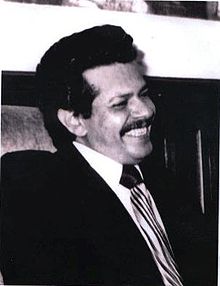Abdel Fattah Ismail
| Abdul Fattah Ismail | |
|---|---|
| عبد الفتاح إسماعيل علي الجوفي | |
 |
|
| Chairman of the Presidium of Supreme People's Council (South Yemen) | |
|
In office 1970 – 21 April 1980 |
|
| Preceded by | Ali Nasir Muhammad |
| Succeeded by | Ali Nasir Muhammad |
| 1st General Secretary of the Yemeni Socialist Party | |
|
In office 21 December 1978 – 21 April 1980 |
|
| Succeeded by | Ali Nasir Muhammad |
| Personal details | |
| Born | July 1939 Ta'izz, Mutawakkilite Kingdom of Yemen |
| Died | 13 January 1986 (aged 47) Aden, South Yemen |
| Political party | Yemeni Socialist Party |
Abd al-Fattah Ismail Ali Al-Jawfi (1939 – 13 January 1986) (Arabic: عبد الفتاح إسماعيل علي الجوفي ʿAbd al-Fattāḥ Ismāʿīl) was the de facto leader of South Yemen from 1969 to 1980.
He served as Chairman of the Presidium of the Supreme People's Council (head of state) and founder, chief ideologue, and first leader of the Yemeni Socialist Party from 21 December 1978 to 21 April 1980. He was summarily executed on 13 January 1986 along with three others, allegedly for "plotting to overthrow" Ali Nasir Muhammad's regime.
Born in July 1939 in the Hugariah district (Taiz) of North Yemen, he was educated in Aden, where he subsequently worked in an oil refinery from 1957 to 1961 as an apprentice. As a co-founder of the Arab Nationalist Movement in South Yemen, he contributed to the formation of a number of Movement cells before he was arrested by the British authorities in Aden for political incitement of workers.
In 1961 he became a school teacher in one of the Aden districts, and at the same time continuing political activity. He was a co-founder of the National Front for the Liberation of South Yemen (NLF). After the NLF started the 14 October 1963 Revolution for the liberation of South Yemen from British colonial rule, Ismail became a full-time revolutionary, whereby he undertook the leadership of the NLF underground military wing (fedayeen) in Aden, as well as political activity.
He was elected to the NLF executive in the first, second and third NLF congresses, 1965-67. After South Yemen gained independence in 1967 he was appointed Minister of Culture and Yemeni Unity. In the fourth NLF congress he was instrumental in determining the progressive line of the revolution. But in March 1968 he was arrested by the right wing of the NLF and went into exile, where he drafted the program for Accomplishing National Democratic Liberation, a leftist manifesto. He undertook a leading role in the consolidation of left wing of NLF which subsequently regained power in the 22 June 1969 "Correction Step."
Subsequent to the "Correction Step" Ismail was elected Secretary General of the NLF Central Committee, thus making him the country's de facto leader. He was also elected a member of the Presidium of the Supreme People's Council. In 1970 he was elected Chairman of Presidium. He undertook a leading role in the dialogue between NLF and other left parties in south Yemen leading to the formation of the Yemeni Socialist Party (YSP). He was elected Secretary General of the YSP at the first party congress in October 1978.
...
Wikipedia
